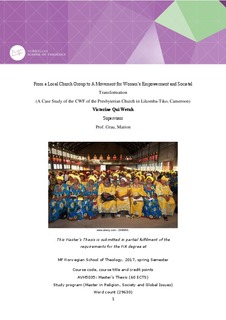From a Local Church Group to A Movement for Women’s Empowerment and Societal Transformation (A Case Study of the CWF of the Presbyterian Church in Likomba-Tiko, Cameroon)
Abstract
This study is designed to explore the ways by which the CWF’s (Christian Women’s Fellowship) Women’s Work Department has empowered healed women spiritually and enabled them to be financially independent, that they may be able to contribute to the wellbeing of their families, the church and the society. It shows how the women are empowered to take part in decision making which concerns them. The study explores the motivations of the CWF’s involvement in the transformation of CWF women within church and the society; impacting them with knowledge and training them on how to take up challenges and set up businesses of their own in order to financially support their families and themselves. This done by means of providing them with loans from their loan program, Women’s Education and Empowerment Program (WEEP). WEEP is one of the departments of the CWF which works with the Nkong Hill Top Association for Development (NADEV), a Common Initiative Group (CIG) which concentrates on developing people and their businesses so that they can help themselves and others – their families and communities.
Women have little or no economic and financial powers in Cameroon, within the traditional setting and even far back as during the western colonial rule in Cameroon. And as stated by Nana-Fabu, “Women’s limited access to and lack of control over resources such as education and bank loans that are more readily available to Cameroon men has led to the further decline of women’s economic status in modern Cameroon. The vast majority of Cameroon women, regardless of educational level, find themselves in a disadvantaged position in the economic sphere”. It is therefore for this reason that this study seeks to find out how the departments of the CWF and their activities help women to be economically empowered and to be financially reliable both for their families and the society.
This study argues that man and woman are both created in the image of God and so should have equal rights and opportunities. In this light, the Ecumenical Decade of Churches in Solidarity with Women 1988-1998, was aimed at bringing equality, development and peace, and to reaffirm the commitments of the World Council of Churches central committee which urged all member churches to eliminate the teachings and practices that discriminate against women. Women should therefore be present and fully represented in all spheres of life. Women should be given equal right to study and to work and to hold positions of responsibility within the church and the society. It is in this light that the Christian Women Fellowship of the PCC through their activities are calling on the church and the society to join forces with them to empower the women for a greater participation and to be great agents of economic and social development.
